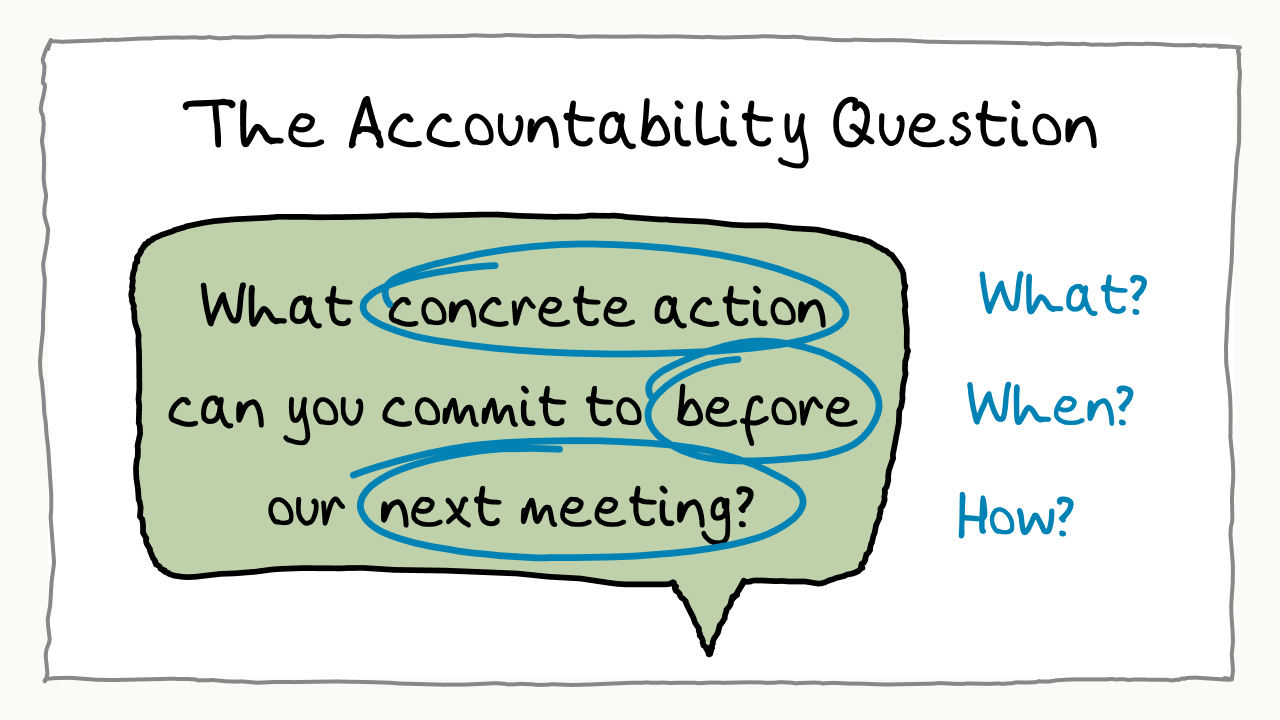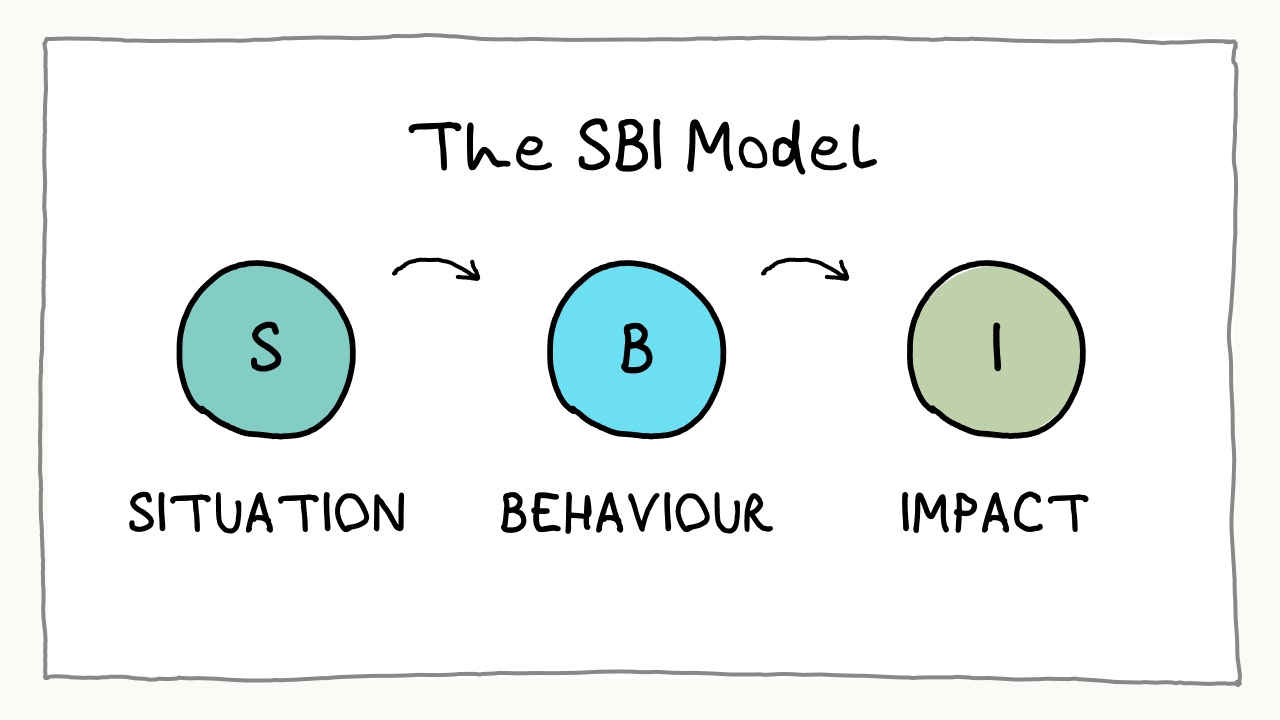A Manager’s Guide to Holding Your Team Accountable
Written by Dave Bailey
If you struggle with holding people to account, try this.
Being held to account for our decisions, actions, and results can drive high performance. It helps clarifies our commitments, increases our diligence, and improves our self-awareness.
Most of us report to someone. For CEOs, it’s a board of directors. For others, it’s their manager or their coach. But despite all our reporting structures, real accountability is elusive for many teams.
Why Accountability Slips
The main reason accountability isn’t held is because holding people to account feels confrontational for both the report and the manager.
For the report, answering a barrage of questions can feel like an inquisition. Top performers often spend time predicting potential questions and preparing answers in advance, just to soothe this discomfort. If you do this, you’re actually holding yourself accountable—great work.
But it can be anxiety-inducing for managers too. The role involves the following:
- Asking probing questions about what happened
- Clarify their report’s explicit and implicit commitments
- Deliver feedback clearly and constructively
When the report struggles to answer a hard question, empathic founders feel the discomfort too. However, a lot of stress comes from a desire to give feedback, and a lot of it. Often, it’s feedback the manager has been sitting on for a while. It’s easy to see mistakes and patterns from a distance, and when feedback builds up, it can be hard to know where to start or how to deliver it.
Accountability slips when managers fail to remind the team of their commitments, ask probing questions about past actions, and deliver constructive feedback. And performance slips with it.
Learn new skills every week ->
Teams Need Both Accountability And Feedback
If you want to be effective at holding people accountable, you also have to be good at providing feedback too. A helpful starting point is to acknowledge accountability and feedback are different processes:
- Holding someone to account: asking probing questions about past actions, decisions and events
- Giving someone feedback: providing your reaction to past actions, decisions and events
To help you drive more accountability in your company—and give more feedback—here’s a quick primer on both.
1) Holding Someone to Account
Holding someone to account means asking probing questions, such as:
- What were you trying to achieve?
- What was your plan?
- What options did you consider?
- What drove your decision?
- What actually happened?
- How did you react?
- When did this happen?
- What did you learn?
- What would you do differently?
These are the same questions boards ask CEOs. They feel exposing because that’s their purpose: to expose someone’s thought process — often revealing mistakes (we all make them!).
These questions increase a person’s awareness (including self-awareness) which in turn can generate insights that lead to professional growth.
For accountability to take place, the report needs to hold a commitment, either explicitly i.e. an agreed action item, or implicitly, as part of their role. If their commitment isn’t clear, accountability falls apart.
“You never specified the report was due by today.”
“Yes, but I was expecting you to read my mind.”
I say this somewhat jokingly, but every manager knows the feeling when they realise a commitment they thought was crystal clear wasn’t as clear as they hoped.
Unclear commitments often stem from unclear roles. Startups often have a more fluid organisation structure since they want people to wear several hats. They rely on high conscientiousness to ensure commitments are held. Over time, startups drive more accountability by clarifying roles, often incrementally after a ball is dropped.

For true accountability to take place, it helps to set up an ‘accountability loop’ with the following three questions:
- What will you do? (the committed action)
- When will you do it? (the timeframe)
- How will I know? (the reporting method)
And there’s one question that gives you the answer to all three at once: What concrete action can you commit to completing before our next meeting?
Following up on action items is the bread-and-butter of accountability. It’s not sexy but just like doing household chores, it’s necessary to make sure everyone plays their part in keeping the house tidy. “Did you take out the garbage?”
However, there will be times when an action item or commitment isn’t completed. In these cases, ask additional questions such as:
- What stopped you from following through?
- Was this the right action? Is this still important?
- What’s the real challenge here for you?
- How will you ensure you follow through next time?
Making commitments and following up on them makes it easy to see whether an executive is keeping their commitments or falling short. If commitments routinely aren’t kept, or if their answers reveal a lack of diligence or competence, then managers must hold themselves accountable for their job: to get the right people in the right roles.
Learn new skills every week ->
2) Giving Someone Feedback

As I wrote in ‘The Best Way to Develop Your Team Isn’t Feedback’, feedback refers to someone’s reaction to something. Asking questions isn’t technically feedback — and therefore, feedback is not holding someone to account.
Some feedback is more useful than others. Feedback you want to avoid are generalised statements, such as:
- ‘You are lazy’ (a character attack)
- ‘You’re always late’ (a generalisation)
- ‘You’re ignoring me’ (implied intent)
Constructive feedback is far more specific. The act of turning vague feedback into something more concrete is valuable for both sides. A useful model of feedback is the SBI model:
- Situation—when specifically are you referring to?
- Behaviour—what did you observe? (i.e. direct quotes, visible behaviours)
- Impact—what was the effect on you and/or the team?
Secretly, many of us are worried that our feedback will be taken personally or interpreted as micro-management, so we avoid giving it. But sitting on feedback can generate resentment and contempt which put significant stress on any relationship.
For feedback to be constructive, it helps if the following three conditions are met:
- The feedback is specific
- The feedback is de-personalised
- The person receiving it is open to hearing it
One way to help set up the conditions for honest feedback is simply to ask permission to give it:
“Do I have permission to give you some specific feedback on [topic]?”
Just clarifying the non-personal topic of the feedback can help take the conversation to a more productive place.`
You might be thinking, ‘do I need to ask permission every time?’ Of course, you don’t need to ask every time. That said, while your position often comes with the implicit expectation that you’ll give feedback, I’ve found that asking for permission can be a helpful way to start a feedback conversation. If it helps, use it, if not, don’t.
Transitioning to Accountability/Feedback
Many managers resist these uncomfortable conversations because they don’t know how to start them. Here are a few ways to begin an accountability or feedback conversation.
- I noticed [concrete observation]. Is everything ok?
- I noticed [concrete observation] happened a few times now. What’s the pattern here?
- [non-personal topic] has been on my mind. Could we have a quick chat to figure it out?
- May we spend a bit of time going through your progress on [initiative]?
- Do you have a few minutes to dive into [initiative] with me?
Questions can be a helpful starting point because they allow the person to share information that you might not have. Of course, for more serious issues, you may ditch the questions and cut straight to the chase.
Learn new skills every week ->
Isn’t This Just Coaching?
Coaching is the art of maximising someone’s personal and/or professional growth. Holding someone to account and providing feedback are both part of the coaching toolkit, but there are many other ways to coach.
In particular, questions that help clarify a person’s goals and values can often be more powerful than asking probing questions about past actions and even giving feedback.
I’ve written a detailed overview of the coaching process, but I’ll stick to accountability and feedback in this essay.
What If You’re Being Held to Account?
There’s no getting around it: being held to account and receiving feedback is challenging for all of us. Even though the job of your manager is to ask questions, challenge your decisions, and provide another point of view, it can still trigger disabling internal narratives such as:
- “They don’t think I’m good enough”
- “They don’t trust me to look after the details”
- “I’m a complete failure”
These narratives can lead to fear, shame and panic… all of which take you out of your comfort zone.
However, discomfort can lead to growth — if you have the right mindset. Try not to take it personally, and instead look for professional insights that can help you improve both the outcomes of your work, and the perception others have of you.
Normalising Accountability & Feedback
Accountability and feedback are essential to high-functioning teams. A helpful starting point is to normalise the following questions:
- “What concrete action can you commit to completing before our next meeting?”
- “Shall we follow up on the actions from last time?”
- “Do I have permission to give you some specific feedback on [topic]?”
When teams are ready to make commitments, receive probing questions, and take constructive feedback on board, without taking it personally, they will find so many opportunities to drive awareness, clarity and professional growth. And that’s where performance begins.
For further reading:
- How to Create a Feedback Culture
- Here’s a Simple Way to Hold Your Team Accountable
- The Best Way to Develop Your Team Isn’t Feedback
Originally published Jun 30, 2021, updated Jul 7, 2023
How do top founders actually scale?
I’ve coached CEOs for 10,000+ hours—here’s what works.
Join 17,000+ founders learning how to scale with clarity.
Unsubscribe any time.




